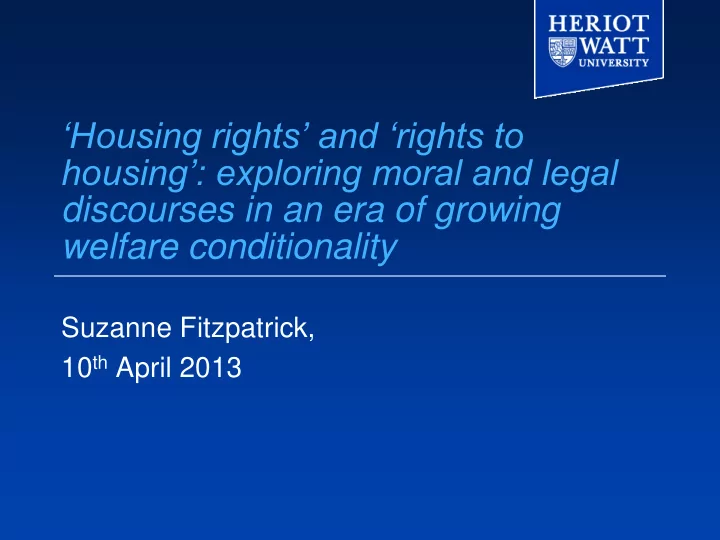

‘Housing rights’ and ‘rights to housing’: exploring moral and legal discourses in an era of growing welfare conditionality Suzanne Fitzpatrick, 10 th April 2013
Introduction Rights – moral and legal; global and national Welfare rights, welfare reform and conditionality ‘Housing rights’ and ‘rights to housing’
The triumph of juridification? Growing clamour for fundamental rights , including social and economic rights, in legal as well as social policy scholarship Vocal demands for a ‘ rights-based approach t o tackling homelessness ’ – Europe (FEANTSA), US, Australia Intuitively appealing – but what precisely do those invoking such rights actually mean? That there is such a right or that there ought to be such a right? Distinction between moral and legal rights – at both global realm and national levels
The global realm Natural rights and human rights – international instruments, e.g. UN, EU, Council of Europe Moral statements about human beings – they ought to have access to these rights, including the right to housing But are these abstract moral rights: …self -evident or a mere rhetorical device ( ‘ rights are trumps! ’ )? What is the foundation of their protected status? …meaningful without enforceability ( ‘nonsense on stilts! ’)? …if enforceable, then undemocratic? – do we want unelected judges determining the allocation of scarce resources?
The national realm The ‘ social rights ’ of citizenship – substantive entitlement to (welfare) goods and services, including housing Programmatic rights – the ‘ right to housing ’ often in constitutions; a ‘ political marker of concern ’ Legal rights – enforceable in court/tribunals; rare to have a legal entitlement to housing, somewhat more common with other welfare goods (especially cash transfers)
Welfare rights and conditionality Legal rights to welfare (both ‘universal’ and ‘selective’) are always conditional ; entitlement is predicated on eligibility Eligibility based on: ‘ club membership ’ (citizenship, contribution records); ‘ status ’ (age, health, disability); means-testing (income, assets) What is new is the intensification of conduct-related conditionality linked to personalised behavioural requirements
ESRC study on ‘Welfare Conditionality’ Five year study – Salford, Heriot-Watt, Sheffield, Sheffield Hallam and Stirling The efficacy (does it in fact bring about the behaviour change sought) and the ethicality (from a range of normative perspectives) of intensifying conduct conditionality in UK welfare Linking developments in housing to those in social security , criminal justice and migration
Welfare Conditionality Methods Statistical, substantive, conceptual/normative mapping exercises International expert panels Key informant interviews with ‘elite’ policymakers and stakeholders Six case study cities, in England and Scotland a. Initial consultation workshops with welfare service users and practitioners b. Focus groups with frontline welfare practitioners c. QLR with 8 panels of 60 welfare recipients subject to conditionality (n=480 x 3 waves of interview)
‘Housing rights’ and ‘rights to housing’ ‘Housing rights’ - rights to protect, e.g. security of tenure, unlawful eviction, excessive rent increases, etc. ‘Rights to housing’ - rights to fulfill, e.g. to provide housing for those who lack it Both types of housing-related rights are subject to increased conditionality in the UK, and focused upon in the ESRC study
‘Housing rights’ and conditionality Security of tenure - fixed-term tenancies are weakening the de jure housing security of social tenants in England Welfare reform (especially the bedroom tax and benefit caps) - weakening the de facto housing security of low-income households across the UK
‘Rights to housing’ and conditionality Enforceable rights to settled housing very unusual – UK and France only Radical divergence in homelessness entitlements across UK: in Scotland, abolition of ‘ priority need’ at end 2012; in England, compulsory discharge of duty into private rented sector In both jurisdictions = homeless applicants ‘responsibilised’ via housing options
Conclusion Maintain critical perspective on all ‘ rights talk ’ What precisely do we mean by a ‘ rights- based approach ’ ? And does it deliver what we expect it to in practice? Examine housing and welfare conditionality through a range of normative ‘lenses’ – citizenship, human rights, social justice and utilitarianism
Recommend
More recommend